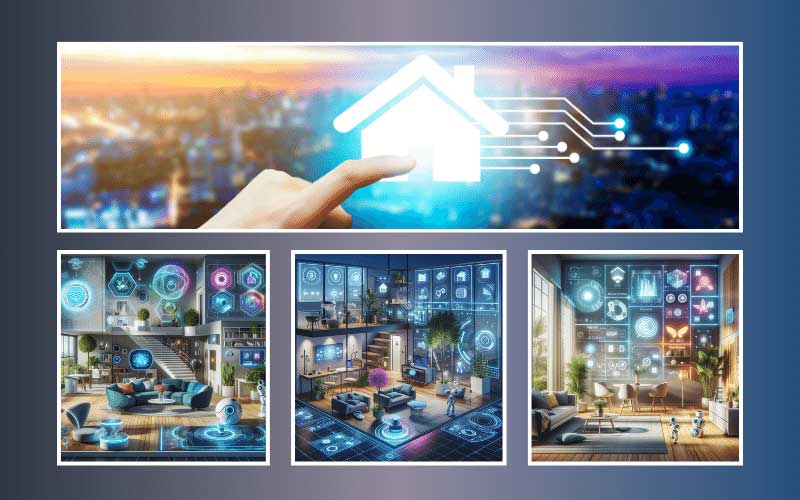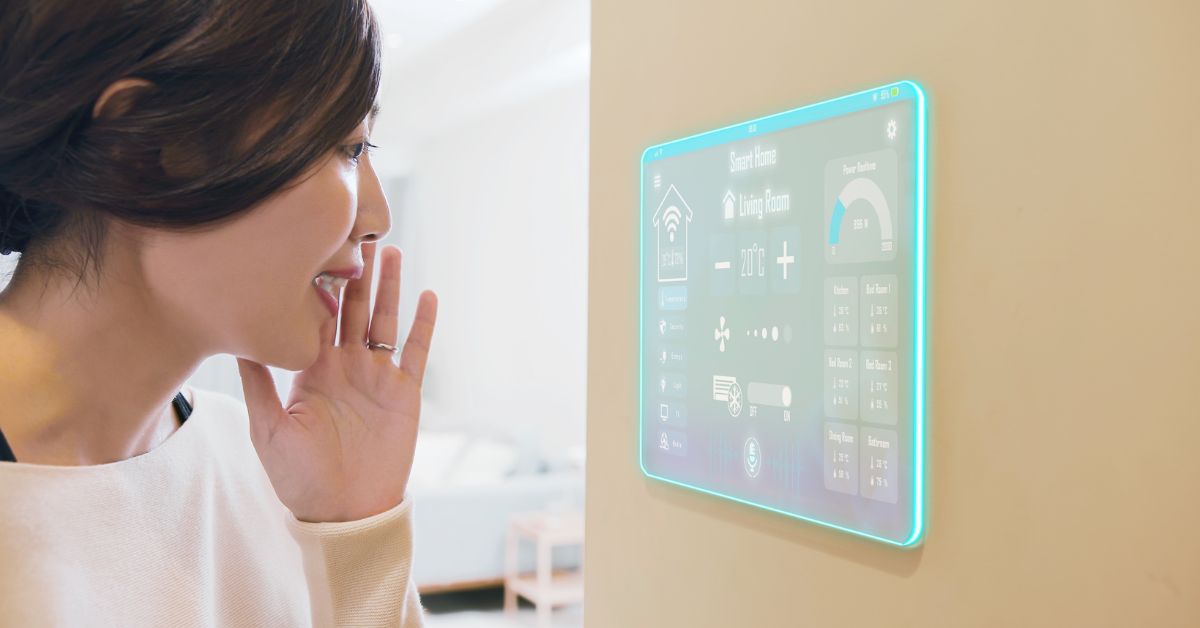A smart home is basically a residence equipped with appliances and devices that are connected to the internet. This allows you to remotely monitor and control them using a smartphone, tablet, or other networked device.
Here are some key features of a smart home:
Convenience:
Imagine turning on lights, adjusting the thermostat, or locking doors from anywhere with an internet connection. Smart homes offer this kind of convenience.
Security:
Smart homes can boost your home’s security with features like smart locks, security cameras, and motion detectors.
Energy Efficiency:
You can control appliances and systems more efficiently, potentially saving on energy costs. For instance, you can program your thermostat to adjust the temperature when you’re away.
In short, a smart home offers an easier, more secure, and potentially more energy-efficient way of living.
What are the elements of Smart Home?

Here are some additional aspects to consider:
Smart Home Devices:
There’s a vast array of smart home devices available, catering to various needs. This includes:
Lighting:
Smart bulbs and switches allow you to control lighting remotely, set schedules, and even adjust colors for ambience.
Thermostats:
Smart thermostats learn your preferences and adjust the temperature automatically, saving on energy bills.
Security Systems:
Smart locks, cameras, and motion sensors provide real-time monitoring and security alerts.
Appliances:
Smart refrigerators can monitor contents, suggest recipes, and even order groceries. Smart washers and dryers can send notifications when your laundry is done.
Entertainment Systems:
Smart TVs and speakers allow voice control and integration with other smart home devices for a holistic entertainment experience.
Smart Home Hubs:
These devices act as a central control point for your smart home devices, allowing you to manage them from a single app or interface.
Voice Assistants:
Many smart home devices work with voice assistants like Google Assistant or Amazon Alexa. This lets you control your home with simple voice commands.
Benefits Beyond Convenience: Smart homes offer more than just ease of use. They can:
Improve Safety: Smart security features deter potential intruders and provide peace of mind.
Enhance Accessibility:
Smart home devices can be particularly helpful for those with physical limitations.
Boost Energy Efficiency:
By monitoring and controlling energy usage, smart homes can help conserve resources and save money.
Considerations:
Cost:
Setting up a smart home can be expensive, depending on the devices and features you choose.
Compatibility:
Ensure the devices you select are compatible with each other and your chosen smart home platform.
Privacy and Security:
Smart home devices collect data, so it’s crucial to choose reputable brands with strong security practices.
Overall, smart home technology offers a glimpse into the future of living, promising a more comfortable, secure, and efficient home environment.
The future of smart homes

The future of smart homes is bright and constantly evolving. Here are some trends to look forward to:
Increased Integration and Automation:
Imagine a scenario where your smart home anticipates your needs. With advancements in artificial intelligence, smart homes will become more intuitive, learning your routines and automatically adjusting settings for optimal comfort and efficiency.
Focus on Wellbeing:
Look for smart devices that promote overall well-being. For example, smart air purifiers can monitor air quality and adjust automatically, while smart mirrors can track health vitals.
Enhanced Security:
Security will continue to be a major focus. Expect to see smarter cameras with advanced features like facial recognition and improved motion detection. Integration with emergency services may also become more prevalent.
Voice Control Advancements:
Voice control will become even more natural and powerful. You might be able to have entire conversations with your smart home assistant, controlling multiple devices and functions with complex instructions.
Sustainable Living:
Smart homes will play a significant role in creating a more sustainable future. Imagine systems that optimize energy usage based on real-time weather conditions or automatically adjust water usage in your garden.
What are the challenges of Smart Homes?
Standardization: Currently, there’s no single standard for smart home devices, which can lead to compatibility issues between different brands. The future might see more unified platforms for seamless device integration.
Cybersecurity Concerns: As smart homes become more interconnected, the risk of cyberattacks increases. Robust security measures and user awareness will be crucial.
Digital Divide: Not everyone has equal access to technology or the internet. Bridging the digital divide is essential to ensure everyone can benefit from smart home advancements.
Overall, smart homes are transforming the way we live. While there are challenges to address, the future holds immense potential for creating personalized, secure, and sustainable living environments.
Applications of smart home technology
Leaning in further, let’s explore some specific applications of smart home technology that might pique your interest:
Personalized Ambiance:
Imagine waking up to gradually brightening lights that mimic sunrise, or arriving home to a calming atmosphere with soft lighting and soothing music – all orchestrated by your smart home system based on your preferences and routines.
Seamless Entertainment:
Smart home hubs can connect your entertainment systems, allowing you to control everything with voice commands or a single app. Want to watch a movie? Simply tell your assistant, and the lights will dim, the curtains will close, and your movie will start playing on your preferred device.
Automated Kitchen Assistant:
Smart refrigerators can create grocery lists based on expiring items or suggest recipes based on available ingredients. Smart ovens can preheat based on your schedule and cook food perfectly according to pre-programmed settings.
Water Management:
Smart sprinkler systems can monitor weather conditions and adjust watering schedules to avoid overwatering your lawn. Leak detectors can alert you to potential plumbing issues before they cause major damage.
Pet Care Integration:
Smart pet feeders can dispense food on a schedule or remotely, even offering video monitoring so you can check on your furry friend while you’re away.
These are just a few examples, and the possibilities are constantly expanding. As smart home technology matures and integrates further with artificial intelligence, we can expect even more innovative applications that will transform our living spaces into truly intelligent and responsive environments.
Global Smart Home Market
Absolutely! Let’s shift our focus to the global smart home market and how you can get involved in this ever-evolving space.
Global Market Trends:
- Exponential Growth: The global smart home market is expected to experience significant growth in the coming years, with estimates ranging from 10% to 27% CAGR (Compound Annual Growth Rate). Source: Estimated Market Size of Smart Homes. This surge is driven by factors like increasing internet penetration, rising disposable incomes, and growing consumer interest in convenience, security, and energy efficiency.
- Focus on Integration and Interoperability: Gone are the days of isolated smart devices. The future lies in seamless integration between different devices and platforms. This will allow for more sophisticated automation and a more holistic smart home experience.
- Voice Control Dominance: Voice assistants like Google Assistant and Amazon Alexa are becoming increasingly popular for controlling smart home devices. Expect voice control to become even more intuitive and powerful, enabling users to manage complex tasks with simple voice commands.
Opportunities for Global Participation:
- Develop Innovative Devices: The market is constantly hungry for new and innovative smart home devices. If you have a creative idea for a product that addresses a specific need or offers unique functionalities, there’s potential to make a mark.
- Focus on Niche Markets: While the major players target broad demographics, there’s space for companies catering to niche markets. This could involve solutions for elderly care, pet monitoring, or specific security needs.
- Software and App Development: The brains behind the brawn! Developing user-friendly apps and software for controlling and managing smart home devices is another lucrative opportunity.
- Cybersecurity Solutions: With growing concerns about data privacy and security in smart homes, there’s a rising demand for robust cybersecurity solutions. Specializing in this area can position you well in the market.
Getting Informed and Staying Ahead:
- Global Tech Publications: Subscribe to publications and websites that cover international smart home trends, product launches, and industry analysis.
- International Trade Shows and Conferences: Attend industry events around the world to connect with global players, learn about cutting-edge technologies, and explore potential partnerships.
- Online Communities and Forums: Join online forums and communities dedicated to smart home technology to network with professionals from across the globe, share ideas, and stay updated on the latest advancements.
The smart home industry is a dynamic and rapidly evolving space. By keeping yourself informed, identifying opportunities, and playing to your strengths, you can become a part of this exciting global phenomenon.
Mind-bending Concepts for Smart Home
As we delve into the even more speculative future of smart homes, let’s explore some truly mind-bending concepts that might seem like science fiction today, but could hold a seed of possibility:
Biometric Integration:

Imagine a future where your smart home recognizes you not just by your voice or fingerprint, but by your unique biological signature. This could involve iris scanners embedded in walls or smart floors that adapt to your weight and gait for ultimate personalization.
Mental State Detection and Response:
Your smart home could become incredibly attuned to your emotional well-being. Advanced sensors might analyze facial expressions, vocal tones, and even physiological markers to detect stress, anxiety, or even happiness. The home could then adjust lighting, music, or even room temperature to create a calming or uplifting environment.
Hyper-Realistic Virtual Experiences:
Imagine a home that can transform any room into a hyper-realistic virtual reality environment. Want to experience scuba diving in the Great Barrier Reef or hiking through the Himalayas? Your smart home could create a fully immersive experience complete with sights, sounds, and even simulated sensations.
Personalized Food Printing and Replicators:
Move over, traditional kitchens! The future might hold smart home appliances that can print or replicate food based on your preferences and dietary needs. Imagine a machine that can analyze your health data and create personalized meals packed with the nutrients you need.
Self-Sustaining Homes and Urban Farms:
Smart homes could become self-sufficient eco-systems. Imagine integrated systems that collect rainwater, generate solar power, and even utilize hydroponics or aeroponics to grow fresh produce within the home itself. Talk about reducing your carbon footprint!
The Merging of Physical and Digital Worlds:
The boundaries between the physical and digital realms could become increasingly blurred. Imagine furniture that can transform based on your mood or activity, or walls that display dynamic works of art that respond to your presence or even your thoughts.
Ethical Considerations and the Future of Humanity
As we push the boundaries of smart home technology, ethical considerations become more crucial than ever. We’ll need to have open discussions about privacy, security, and the potential impact of such intelligent environments on human behavior and social interaction.
These are just a few ideas to spark your imagination about the mind-boggling future of smart homes. The ultimate goal should be to create technology that enhances our lives, fosters well-being, and allows us to live more comfortably, sustainably, and creatively. The future of smart homes is a story waiting to be written, and how it unfolds depends on the choices we make today.


